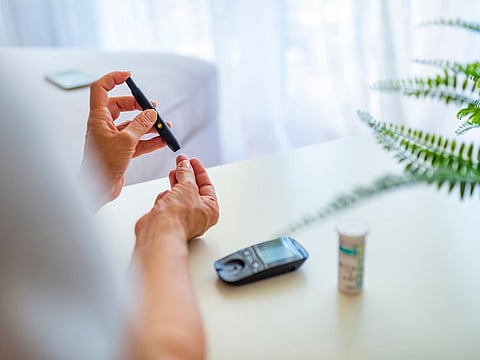Managing diabetes during COVID-19
For diabetics, it is important to manage blood sugar levels and take precautions

COVID-19 is a global virus that has significantly impacted all of our lives. It has also been widely reported that people with underlying health conditions, such as diabetes, are more susceptible to complications if they do contract the coronavirus.
Dr Muhammad Hamed Farooqi, Director and Consultant Endocrinologist, Dubai Diabetes Centre, says that the global uncertainty could also be a cause for people with diabetes to see an elevation in their blood sugar levels. “These are unusual times and you may find that your blood sugar readings are not to your expectations. There is no need to panic because if you do panic, it will create a vicious cycle where your anxiety levels and blood sugar levels will go up.
“We are all in this situation together and we need to follow advice from our healthcare teams, follow a healthy diet plan, exercise and support ourselves, our families and others - to tide over these tough times in the best way we can.”
If your diabetes isn’t under good control it can [lower] your resistance to disease… maybe your immune response may not be the same as someone who doesn’t have diabetes.

Dr Farooqi says that his patients tend to ask him two main questions about diabetes and COVID-19. “People ask, if I’m a diabetic, am I at a higher risk of contracting COVID-19? Our understanding at this point is that the chances of infection for anybody in the population is pretty much the same, whether you have diabetes or not. Therefore, you have to ensure that you are taking all of the proper precautions, such as washing your hands and following social distancing.
“We also get asked if people who are older or who have a chronic disease, such as diabetes, are at more risk of complications from COVID-19?
“If your diabetes is not under good control it can lead to your resistance to any disease being lower. Therefore, when you put up a fight after being exposed to the virus, maybe your immune response may not be the same as someone who does not have diabetes.”
Managing stress
Dr Farooqi acknowledges that the current situation can cause stress and says that it’s important for people with diabetes to correctly manage their health and consult their doctor if they see an elevated blood sugar level. “These are stressful times and when people are stressed, blood sugar levels tend to rise as a result of the stress’ effect on the chemicals in our bodies. For example, our adrenalin levels go up whenever there is stress.
“If you feeling stressed and you think your blood sugar levels are higher than usual, the best advice is to talk to your healthcare provider.
“Most people in general are not physically going to clinics but their doctors are available over the phone. They can offer advice on how to adjust your blood sugar levels and that should take care of the issue.
“Depending on what treatment plan you are on, your physician will advise a frequency for checking your blood sugar levels. If someone is on dietary control for their diabetes then generally they don’t check their blood sugar levels often, but if they are oral medications, then they may need to check one or two times a day. People on insulin check more often than that. I would recommend that patients continue with their advised frequency unless they see that their levels are frequently becoming high and then maybe they can increase the frequency of monitoring. But, if you do see an extended increase in your blood glucose levels, the key point is to get in touch with your physician.”
Staying healthy at home
With many of us working from home because of the virus, Dr Farooqi says that it is imperative to take steps to stay healthy. “We recommend that people find a substitute for keeping active if they are at home. There are so many different suggestions and advice available. Last week, some people ran marathons inside their flats, so it is possible to exercise if you’re creative.
“For maintaining a healthy diet, I would recommend not stocking your fridge with food items you are not supposed to have, such as soda. Also, make sure you have healthy and sugar-free snacks available if you’re prone to snacking.”
Dr Farooqi says you should also work towards minimising your risk of infection by following government advice, particularly if you have diabetes. “It is imperative that people with diabetes work towards staying as safe and healthy as they can during this time.”


